Newsletter: Faced with blowback over his pardon of Binance founder Changpeng Zhao, President Trump has offered a curious defense: he doesn’t even know the guy.
https://www.citationneeded.news/trump-binance-changpeng-zhao-pardon/
Post
Newsletter: Faced with blowback over his pardon of Binance founder Changpeng Zhao, President Trump has offered a curious defense: he doesn’t even know the guy.
https://www.citationneeded.news/trump-binance-changpeng-zhao-pardon/
@molly0xfff Thanks for your wonderful work 🙏
Question: Isn't/wasn't Binance (and all the other crypto shit) a HUGE reason for the all that drug trafficking that Trump is claiming to fight?
@benjaoming It’s certainly a factor, yes.
@molly0xfff
And he paid the full pardon fee. So why are the public mad at their Glorious Leader?
@molly0xfff Something something autopen.
@molly0xfff I thought Trump was above this stuff. I'm surprised he didn't just say "Changpeng Zhao paid me a lot of money so I pardoned him, what's the problem?"
@molly0xfff Again, liar boy.
@molly0xfff “Legally speaking, I know nothing. I am a legal lycanthrope. A Bruce Banner. A Dr. Jekyll.” — Donald Trump, probably
you see,
Zhao was simply one of the biggest men trump has ever seen, who had tears in his eyes when he dropped to his knees and said 'lord trump, they treated me so unfairly, just ask your very large sons.'
everyone is saying it
Trump said in his latest interview he “was told” Binance’s Changpeng Zhao is “highly respected”, “very successful”, and was unfairly prosecuted — without saying who, exactly, was doing the telling.
Asked about corruption, he bristled: “I’d rather not have you ask the question.”
Trump has portrayed Zhao’s case as part of an unfair “war on crypto”. But Zhao pleaded guilty to knowingly breaking the law; and the indictment depicts a CEO and leadership intentionally violating US laws to keep lucrative customers, enabling terrorist financing and cybercrime.
![By the time Trump pardoned him, Zhao had already served four months in prison and paid a $50 million fine after admitting he violated the Bank Secrecy Act by failing to run an effective anti–money‑laundering program at Binance. Binance itself paid $4.3 billion and pleaded guilty to three related charges involving unlicensed money-transmitting and sanctions violations. Prosecutors and regulators argued those failures helped illicit funds move to terrorists, sanctioned groups, cybercriminals, and child abusers.2
Though Trump and members of his administration have portrayed the case against CZ as mere persecution as part of a larger Biden-led war on crypto, court documents describe a CEO and other company leadership intentionally breaking US laws to maintain access to lucrative US-based customers, and setting up a complex scheme to divert regulatory attention away from the company’s crimes [Binance charges].](https://media.hachyderm.io/media_attachments/files/115/488/185/138/451/808/original/87c07cb52a0d7914.png)
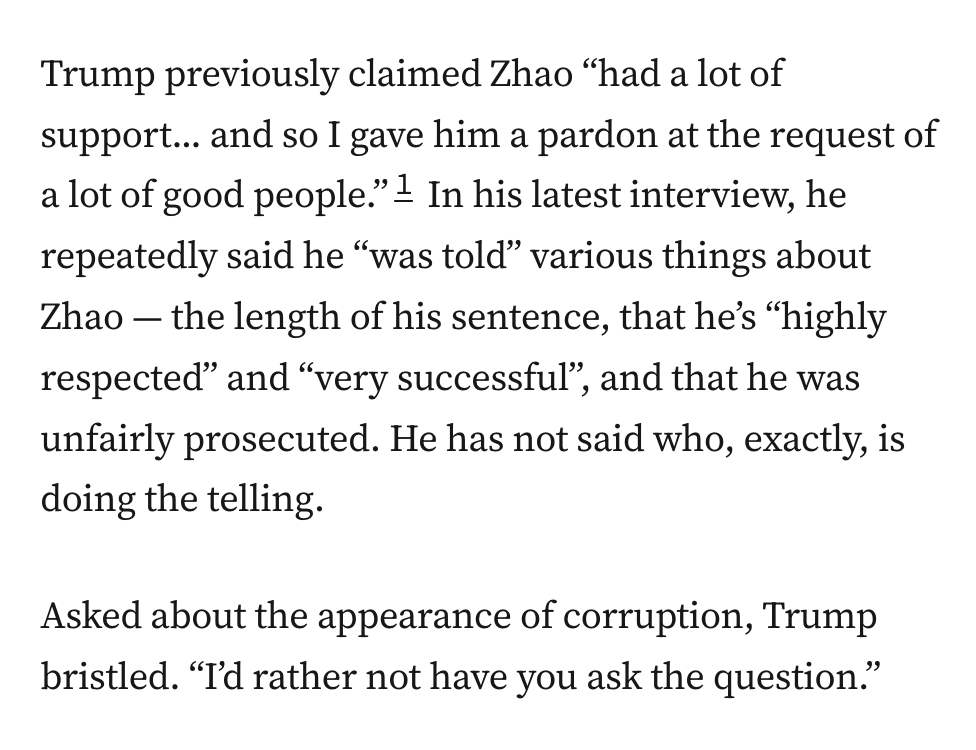
At the very end of a 60 Minutes interview, Trump was asked why he would pardon someone alleged to be a threat to national security. Trump replied, “I don't know who he is. ... They sent him to jail and they really set him up. That’s my opinion. I was told about it.”
O’Donnell tried again. Trump repeated that he knew “nothing about it” because he’s “too busy”, then described his sons’ success in the crypto business.
When O’Donnell took a third swing at it, asking if Trump was “not concerned about the appearance of corruption”, Trump responded: “I can’t say, because– I can’t say– I’m not concerned. I don’t— I’d rather not have you ask the question.”
![Finally, when O’Donnell repeated, “So [you’re] not concerned about the appearance of corruption with this?” Trump seemed to grow irritated. “I can’t say, because– I can’t say– I’m not concerned. I don’t— I’d rather not have you ask the question. But I let you ask it. You just came to me and you said, ‘Can I ask another question?’ And I said, yeah. ... I don’t mind. Did I let you do it? I coulda walked away. I didn’t have to answer this question. I’m proud to answer the question.”](https://media.hachyderm.io/media_attachments/files/115/488/192/265/414/590/original/73dfd254826d2dcf.png)
![Asked again why Trump would pardon someone accused of “significant harm to U.S. national security”, with O’Donnell noting the appearance of pay-to-play after Binance’s involvement in a $2 billion deal including the Trump family’s World Liberty Financial stablecoin [I95, 93, 83], Trump repeated: “I know nothing about it because I’m too busy doing the other—” then began describing his sons’ substantial crypto business dealings and the fact that his son and wife each wrote bestselling books, concluding the ramble with “I’m proud of them for doing that. I’m focused on this.”](https://media.hachyderm.io/media_attachments/files/115/488/191/634/812/404/original/500620abf32f8518.png)
![But after the wide-ranging interview concluded, O’Donnell asked if she could squeeze in one more set of questions. After laying out the history around Changpeng “CZ” Zhao’s conviction, noting that “the government at the time said that C.Z. had caused ‘significant harm to U.S. national security’, essentially by allowing terrorist groups like Hamas to move millions of dollars around”, she asked Trump why he’d decided to pardon Zhao late last month [I95]. Trump replied, “I don't know who he is. I know he got a four-month sentence or something like that. And I heard it was a Biden witch hunt. ... [T]his man was treated really badly by the Biden administration. And he was given a jail term. He's highly respected. He’s a very successful guy. They sent him to jail and they really set him up. That’s my opinion. I was told about it.”](https://media.hachyderm.io/media_attachments/files/115/488/190/136/119/202/original/ac93b8a763af1d85.png)
@molly0xfff i'm proud to answer the question, he says, not doing that
@molly0xfff While I shouldn't be at this point, I'm completely dumbfounded.
Lies are his life.
Troubling question - lie.
Project 2025 - never heard of it.
Epstein - hardly knew the guy.
Rape victim - don't know her.
@molly0xfff Let us all keep in mind this is from an interview ended by a very Trump-friendly production team. This is the *best* version of his answer.
@molly0xfff @wordshaper Every word he says sounds like someone who never plans on giving up power or leaving the White House.
Trump’s attempt to dodge responsibility for pardoning Changpeng Zhao follows sustained criticism, including from some of his usual allies.
@molly0xfff
Looks like fraud, walks like fraud, and quacks like fraud.
@molly0xfff yes..."makes it look."
Zhao has also been lashing out, recently threatening to sue Senator Elizabeth Warren for defamation over her statement that “CZ pleaded guilty to a criminal money laundering charge and was sentenced to prison. But then he financed President Trump’s stablecoin and lobbied for a pardon.”
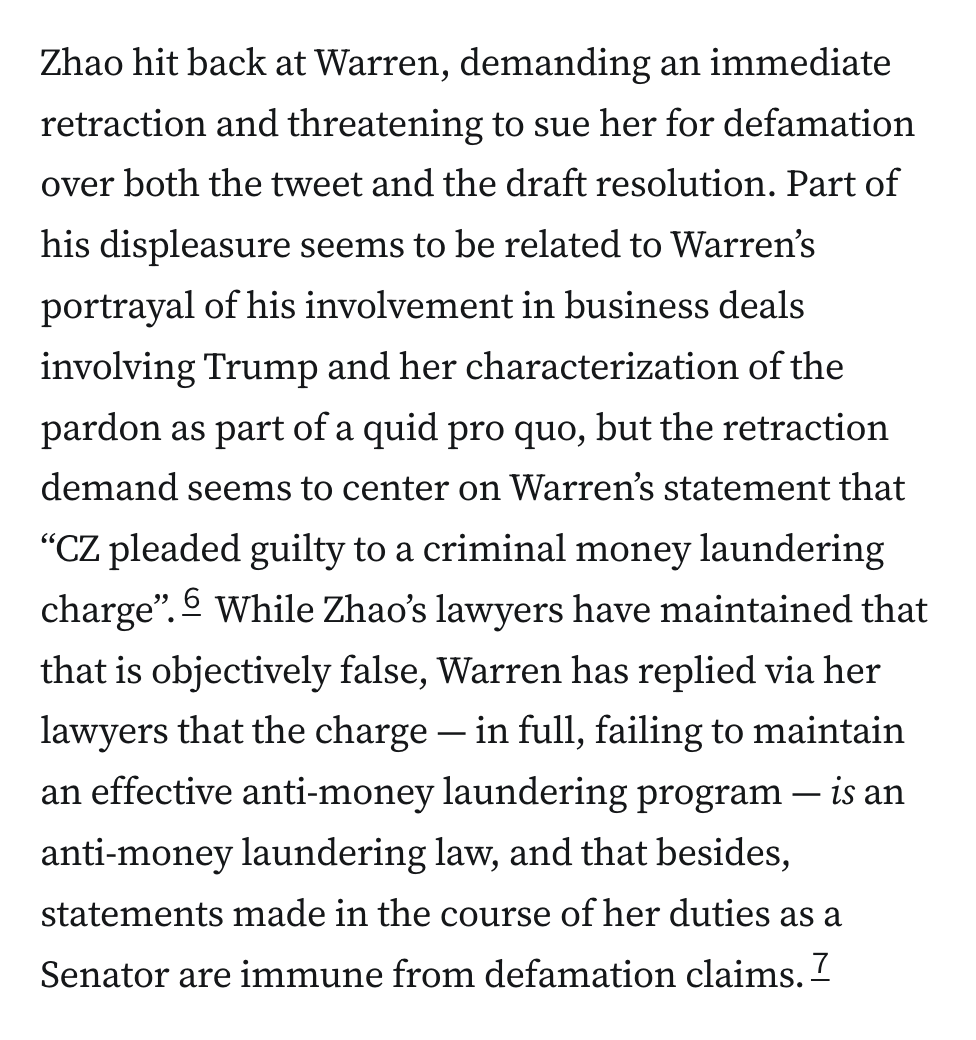
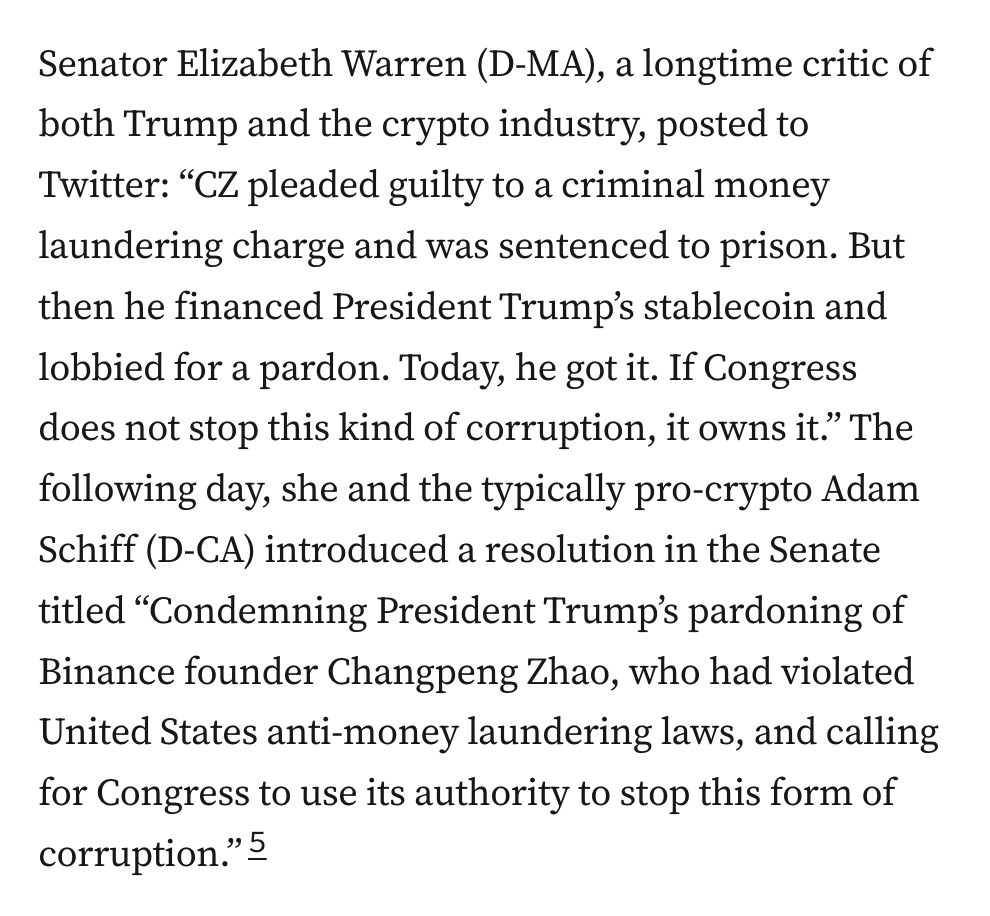
@molly0xfff He SHOULD sue her… so her lawyers can find out during discovery that he did bribe Trump for a pardon.
Senator Warren is only one of a group of Democratic Congresspeople who have been demanding answers about the pardon and the apparent quid pro quo.
![The letter concludes with a series of questions about how Trump’s pardon will complicate law enforcement activities, what message it will send to criminals and to the crypto industry, and whether they believe Trump’s business involvement with Zhao influenced his decision. It’s signed by Senators Warren, Van Hollen (D-MD), Sanders (I-VT), Hirono (D-HI), Blumenthal (D-CT), Reed (D-RI), and Merkley (D-OR).8
Senator Murphy (D-CT) has also been on the warpath over the pardon, which he has called “pay-to-play”. After Binance’s US arm announced they would launch USD1 trading for customers in the US on October 29,b Murphy wrote: “One week after Trump pardoned Binance’s owner (for a stunning array of crimes related to terrorist and sex predator financing), Binance starts promoting Trump crypto. The White House is a full time, 24/7 corruption machine.”9 Binance.US responded to his allegations, writing, “[T]his was a business decision on the part of BinanceUS and nothing more. It’s unfortunate that even routine business decisions are now unfairly politicized by our elected officials.”10](https://media.hachyderm.io/media_attachments/files/115/488/199/210/964/254/original/dd10638f038c063b.png)
![The letter outlines a timeline during which “Binance and Mr. Zhao began cozying up to the President and his family through a series of financial deals”. It details how Zhao and Steve Witkoff met in December 2024 at a cryptocurrency conference in Abu Dhabi. (Witkoff co-founded World Liberty Financial, a crypto company partly owned by Trump and his sons. When Witkoff became Trump’s special envoy to the Middle East and special envoy for Peace Missions, the company claimed he was in the process of divesting, though recent disclosures suggest he hasn’t [I95].) Next in the timeline, the Senators cite reporting that World Liberty had “discussed doing business” with Binance, potentially by having Binance develop a stablecoin. Then, they cite reporting about World Liberty’s launch of the USD1 stablecoin, and later reporting that Binance “wrote the basic code” for the token and promoted it to its large customer base. Finally, they point to the $2 billion deal, denominated in USD1, between Binance and the Witkoff-linked Emirati firm MGX — a deal that has already earned World Liberty around $35 million in interest since May [I95]. Trump and his family members hold a stake in World Liberty, and earn a portion of its revenue.](https://media.hachyderm.io/media_attachments/files/115/488/199/214/725/100/original/e333dc43dca1ab53.png)
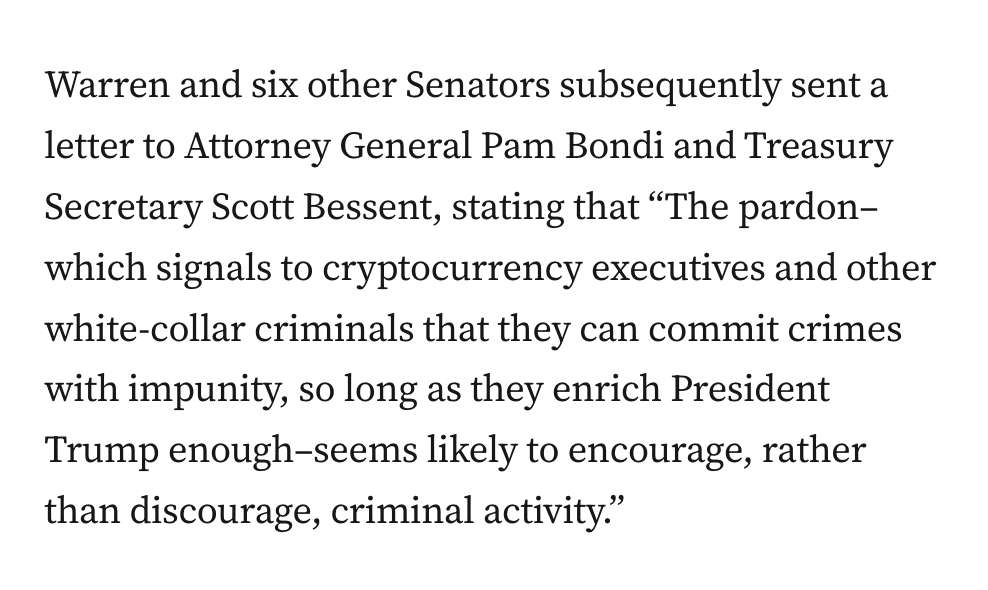
Trump’s defense of the pardon is poorly timed, coming only a week after the House Oversight Committee published a Republican staff report stating: “The authority to grant pardons is not provided to the president’s inner circle.”
By that logic, Trump’s defense should invite the very same scrutiny from House Oversight Chair James Comer (R-KY). When asked, Comer replied, “I would assume he knew. ... Sometimes he says things and we have to really analyze and give him another opportunity to make sure he didn't misspeak.”
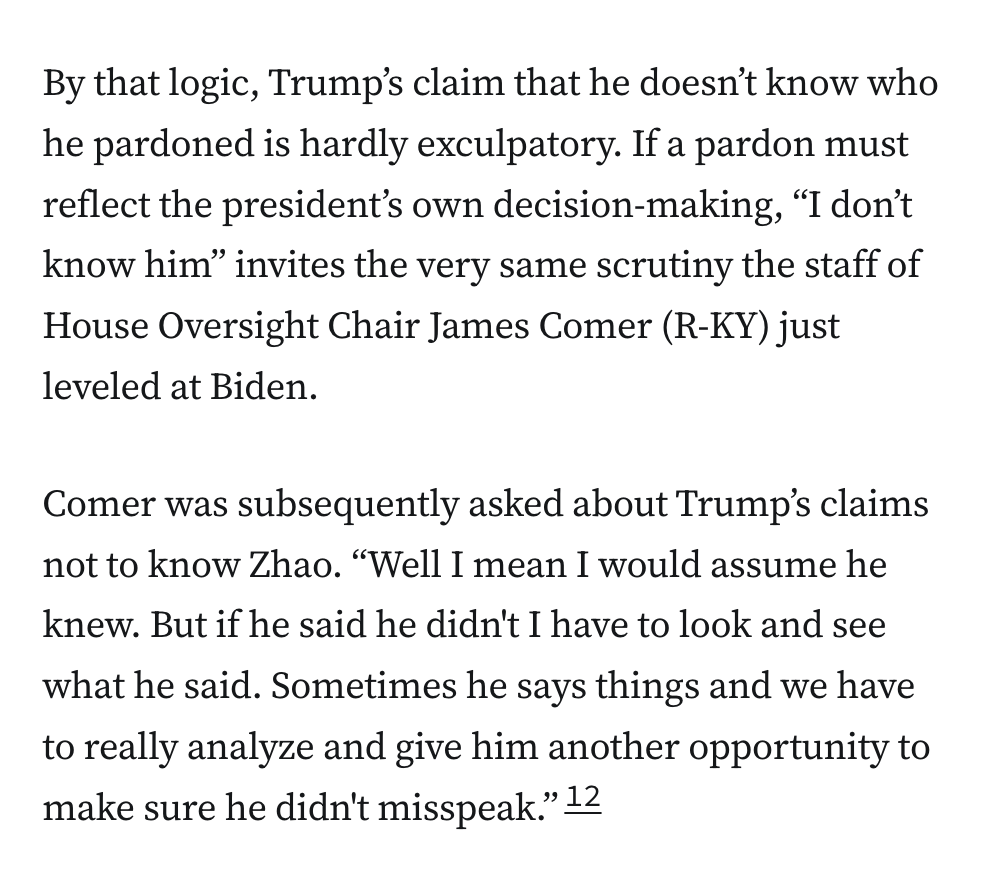
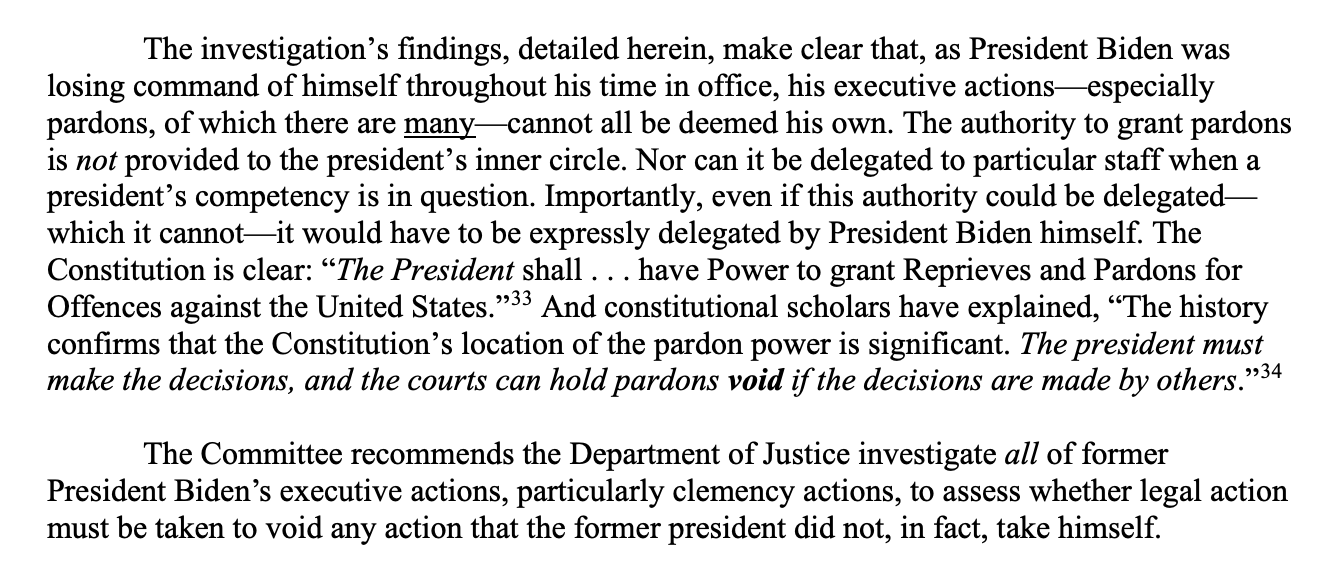
![The House Oversight Committee report
Trump’s attempt to dodge accountability for the pardon is poorly timed, coming only a week after the House Oversight Committee published a Republican staff report opining that executive actions signed by Biden with an autopen device are “void”, and recommending the Justice Department “address the legal consequences”. According to the report, this includes Biden’s last-minute pardons of his own family and various members of his administration.
The report declares with great horror that “[Biden’s] executive actions—especially pardons, of which there are many—cannot all be deemed his own,” and cites the opinion of constitutional scholars that “The president must make the decisions, and the courts can hold pardons void if the decisions are made by others.”11](https://media.hachyderm.io/media_attachments/files/115/488/202/934/475/805/original/29ff04dca64655f4.png)
A space for Bonfire maintainers and contributors to communicate